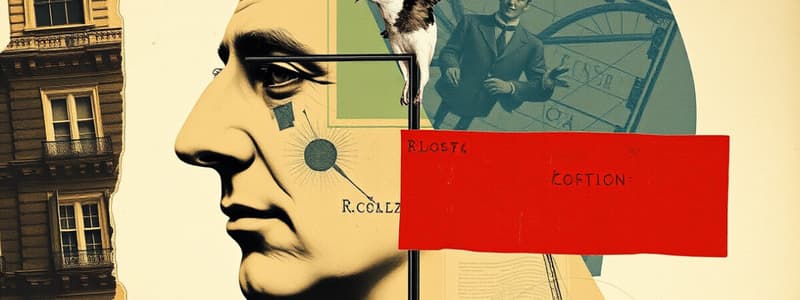Podcast
Questions and Answers
Carl Rogers was a contemporary of Freud and primarily focused on abnormal psychology.
Carl Rogers was a contemporary of Freud and primarily focused on abnormal psychology.
False (B)
The ideal self represents who you are in reality, while the real self is the person you aspire to be.
The ideal self represents who you are in reality, while the real self is the person you aspire to be.
False (B)
Achieving consistency between the real self and ideal self leads to higher self-worth according to Rogers.
Achieving consistency between the real self and ideal self leads to higher self-worth according to Rogers.
True (A)
Incongruence occurs when there is little to no difference between the ideal self and real self.
Incongruence occurs when there is little to no difference between the ideal self and real self.
Rogers defined self-actualization as reaching one's highest potential, which is always influenced by external factors.
Rogers defined self-actualization as reaching one's highest potential, which is always influenced by external factors.
A fully functioning person, according to Rogers, experiences significant incongruence between their ideal and real self.
A fully functioning person, according to Rogers, experiences significant incongruence between their ideal and real self.
Unconditional positive regard refers to conditional acceptance based on an individual's achievements.
Unconditional positive regard refers to conditional acceptance based on an individual's achievements.
Rogers believed that stress and anxiety could be reduced by achieving unity in one's self-concept.
Rogers believed that stress and anxiety could be reduced by achieving unity in one's self-concept.
Flashcards are hidden until you start studying
Study Notes
Carl Rogers and the Study of Self
- Carl Rogers was a counselling psychologist and a key figure in the development of the humanistic approach to personality.
- He collaborated with Abraham Maslow, sharing the belief that humans are inherently goal-directed.
- Rogers divided the concept of self into two categories: the ideal self and the real self.
- The ideal self represents the individual one aspires to be, while the real self reflects the individual's actual condition.
- Achieving consistency between the ideal and real selves is crucial for personal development and mental well-being.
Unity and Self-Concept
- High unity occurs when perceptions of the real self and ideal self closely align, leading to an accurate self-concept.
- A well-aligned self-concept fosters a greater sense of self-worth and contributes to a healthy, productive life.
- Discrepancies between the ideal and real selves can result in incongruence, a state that Rogers identified as detrimental and linked to maladjustment.
Self-Actualization and Fully Functioning People
- Rogers proposed that congruence between the ideal and real self facilitates self-actualization, which represents the maximum potential of an individual.
- Individuals who achieve this congruence are termed "fully functioning people."
- Lack of harmony between the ideal and real selves may lead to anxiety and stress, undermining personal growth.
Influence of the External Environment
- Rogers emphasized the role of the external environment in fostering unity in self-concepts.
- Unconditional positive regard from significant others—accepting and valuing an individual without conditions—is vital for achieving personal worth and self-actualization.
- This acceptance allows individuals to internalize a sense of value, contributing positively to their self-concept and psychological well-being.
Studying That Suits You
Use AI to generate personalized quizzes and flashcards to suit your learning preferences.



